Biobased resources
A major goal of the bioeconomy is to use larger quantities of biobased raw materials to produce energy, transport fuels and feedstock for industrial processes. This requires detailed analyses, simulations, concepts and processes. Major focus needs to be placed on issues relating to crop production, biomass potentials, land surface requirements, conversion technologies, biobased value creation networks and food security. Agriculture, forestry, waste management and the industry in general will need to work in concert as far as the raw materials all of them use or deal with are concerned.
-
ProGrün project - 30/12/2023
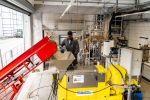
Animal feed often contains protein from soy and importing it causes major environmental harm. In the ProGrün project, researchers at the University of Hohenheim, including a work group led by Prof. Dr. Andrea Kruse, are developing a scalable technological process to extract proteins from grassland cuttings and use them to make sustainable animal feed produced in the region where it will be used.
-
Alternative construction materials: mycelium-based materials - 20/12/2023

Most of us see fungi as just food - and possibly pathogens. This is a mistake, because these amazing organisms are capable of much more: they grow on plant residues of all kinds, forming a dense and interconnected structure as they spread. The resulting material can be moulded into desired shapes and be turned into new sustainable and economically attractive products such as leather and polystyrene substitutes or building materials.
-
Facade greening with precipitation retention - 19/12/2023
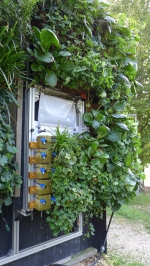
Due to dense urbanisation and associated soil sealing, heat and heavy rainfall are becoming an increasing problem for people living in cities. Researchers at the German Institutes of Textile and Fibre Research (DITF) in Denkendorf have developed innovative living walls that not only help cool the environment, but also provide flood protection thanks to their water retention properties.
-
Sustainable binder alternative - 18/12/2023
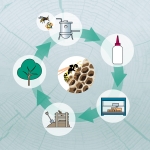
Plastic is all around us; and unfortunately, it is not going away any time soon. The search for more sustainable solutions is fully underway. However, binders that degrade only with difficulty or not at all are still used to bond natural materials such as wood and straw - not yet truly environmentally friendly. Fraunhofer researchers are working on an insect-inspired wood binder that makes bonded wood products both resistant and biodegradable.
-
urban BioEconomyLab - 07/12/2023
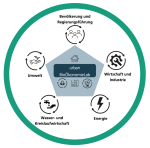
Baden-Württemberg is leading the way in the transition to a climate-neutral and sustainable economy. One of the projects undertaken is the Fraunhofer IGB’s "urban BioEconomyLab" project which aims to develop a transformation model and living laboratory to find bioeconomic solutions for the sustainable design of cities and municipal industry. What is new is that the IGB takes a systemic approach, focusing on biobased and circular value…
-
Recent research shows effectiveness of biosurfactants - 28/11/2023
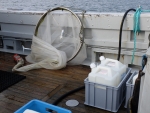
Oil spills from drilling platforms and tankers cause environmental pollution and a loss of biodiversity. Researchers at the University of Stuttgart, among others, are now using biosurfactants to improve the management of oil spills: their latest research shows that biosurfactants lead to better microbiological degradation of oil components in seawater compared to conventional dispersants.
-
The AlbLavendel project - 20/11/2023

Blue-violet, fragrant fields like those in Provence may soon become a common sight in the Swabian Alb. As part of the AlbLavendel project, the University of Hohenheim along with the company naturamus GmbH and the German Institutes of Textile and Fibre Research Denkendorf has started to investigate the cultivation of lavender, the production of essential oils and the use of distillation residues for producing textile fibres in the local region.
-
Climate-neutral wastewater treatment plants thanks to patented real-time analytics - 08/11/2023
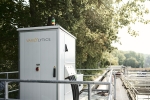
The wastewater industry is responsible for global greenhouse gas emissions equivalent to those of global aviation. The start-up Variolytics has found a way to significantly reduce greenhouse gases in wastewater treatment plants using real-time analytics. The patented sensor technology and AI-supported process optimisation offer multiple benefits: in addition to reducing nitrous oxide, the system helps to reduce energy costs and resources.
Website address: https://www.biooekonomie-bw.de/en/articles/biobased-resources







